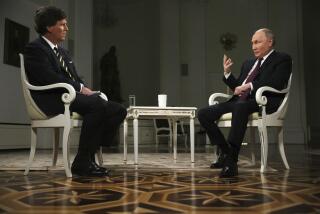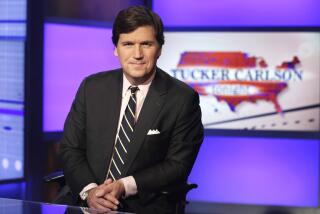Reporter’s Hardball: What About Yeltsin? : The media: Stunned silence, then nervous laughter follow Soviet journalist’s question about Gorbachev’s nemesis.
SHINGTON — In the newspaper game, the guy from Izvestia pitched a fast one right down the middle.
Where Sam Donaldson once stood, trying his best to stump Ronald Reagan on prime-time television, Stanislav Kondrashev faced down “Comrade Gorbachev” Sunday morning. The political commentator for the Soviet government newspaper Izvestia told the Communist Party chief and Soviet president that this perestroika business and buddy-buddy summit with George Bush were all well and good, but what about Yeltsin?
The stunned silence, particularly among U.S. reporters, gave way to nervous laughter. There, in the elegant East Room of the White House, the drama of Mikhail S. Gorbachev’s glasnost was played out live for all to see, including a nationwide audience in the Soviet Union.
It was the first time the White House had been the setting for a joint press conference featuring the President of the United States and the leader of the Soviet Union. The two sat side by side for an hour, answering questions from the White House press corps, traveling Moscow reporters and the international media assembled in Washington for the four-day summit.
As for the hardball question on Boris N. Yeltsin, Gorbachev’s maverick nemesis who was elected president of the Soviet Union’s Russian republic last Tuesday, the Soviet president told his questioner: “I don’t think you have chosen the best place for clarifying our internal problems, but c’est la vie, as they say.”
With that, he proceeded into a characteristically lengthy response. Gorbachev, it seems, has not learned to just say nyet to a microphone.
Nor has he mastered the art of sound bites--those pithy phrases that invite television network headlines. In fact, brevity of any kind is not his forte. At the start of the news conference, Bush delivered an opening statement of about 470 words. Gorbachev stretched his out to 1,250.
There was nothing in the demeanor of the two presidents that indicated this East Room press conference was unprecedented. If anything, they displayed the ease of all-stars who have opposed each other in the past and may very well do so in the future, but who for this game find themselves on the same team.
They sat at a heavy wooden table, with pairs of U.S. and Soviet flags standing to each side. They tossed their answers back and forth, first one, then the other.
After Bush had tackled a question and follow-up, Gorbachev took the first crack at the next question, addressed to both of them. “Let me begin first, in order to let President Bush have a little rest,” he said playfully.
The questions came in English and Russian--English from the American reporters seated in front of Bush and Russian from the reporters from Izvestia; Pravda, the Communist Party newspaper, and the New Times weekly Soviet magazine. Each president wore a cup-like earpiece through which he received a simultaneous translation of the questions and answers.
An attempt at Russian by the Moscow correspondent of The Guardian, the British newspaper, led Gorbachev to fiddle with his earpiece, as if in a struggle to determine just what language he was hearing.
With the exception of the question about Yeltsin, there were few surprises in the topics raised.
A news agency reporter who frequently asks about the Middle East wanted to know: “Why is it that President Gorbachev has shown so much human sympathy for the Palestinians while the U.S. vetoes even a U.N. look at their plight under military siege?”
Gorbachev initially deferred to Bush on that one but then followed Bush’s answer by saying: “Just a moment, I’d like to respond too.”
He went on to drop a minor bombshell, saying that the Soviet Union may once again bar Jews from emigrating unless Israel provides guarantees that the new arrivals will not be settled in the occupied West Bank or Gaza Strip.
Other questions dealt with whether differences over the future of a united Germany had been narrowed--Bush said that he wasn’t sure they had been--and with the just-signed U.S.-Soviet trade agreement, among other topics.
The two men wore the sober news conference uniform--dark business suits--and each put on metal-frame glasses to read his opening statement. Bush took notes while Gorbachev spoke.
When the hour had passed, both stood as if to leave but lingered a minute or so to answer more questions before retreating down the red carpet of the White House’s long first-floor hallway.
More to Read
Sign up for Essential California
The most important California stories and recommendations in your inbox every morning.
You may occasionally receive promotional content from the Los Angeles Times.










